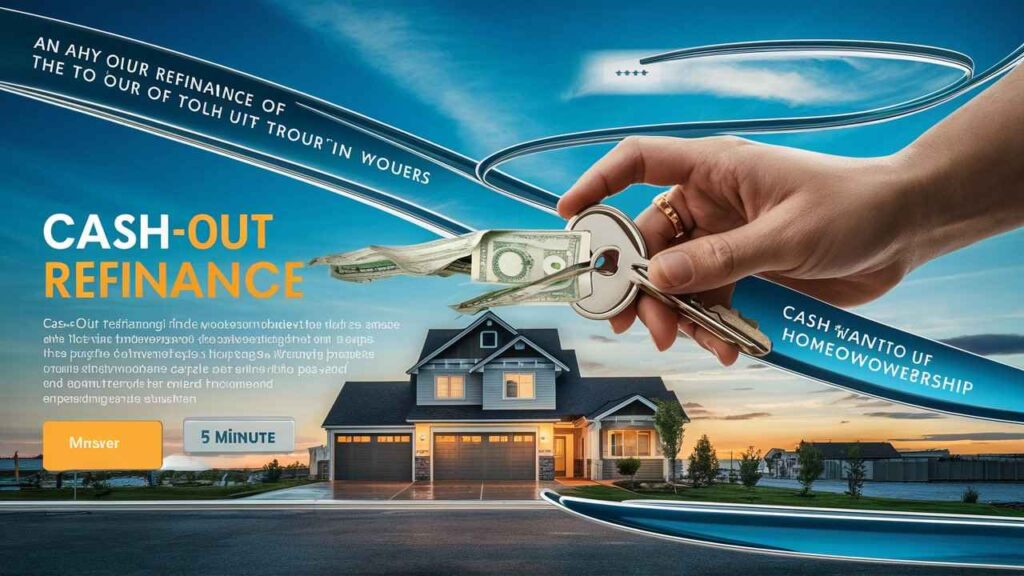In a world where homeowners constantly look for smarter ways to leverage their property, the Cash-Out Refinance Mortgage is gaining serious attention. This financial tool allows you to turn the equity in your home into cash🏚️without selling a single brick. Let’s take a closer look at how a Cash-Out Refinance Mortgage works, and why it might be the perfect solution for your financial needs.

What Exactly Is a Cash-Out Refinance Mortgage?
A Cash-Out Refinance Mortgage lets you replace your existing mortgage with a new, larger loan, giving you cash for the difference. Essentially, it’s like borrowing money against the portion of your home that you own outright, often at lower interest rates than personal loans or credit cards. It’s a unique way to extract value from your home without saying goodbye to it.🏚️
How Cash-Out Refinance Differs from Other Loans
With a traditional refinance, you replace your mortgage with a new one but keep the loan amount the same. A Cash-Out Refinance Mortgage, however, lets you increase the loan size and take the difference as cash. It’s a bit of a hybrid between refinancing and borrowing, allowing you to rework your mortgage while tapping into your home’s equity.

Unlocking the Mystery of Home Equity
Home equity is the financial value you’ve built in your home🏚️essentially, it’s the part of your home that’s “paid off.” For many homeowners, equity is the secret treasure chest. The more you pay down your mortgage or the more your property’s value rises, the more equity you accumulate.
Home Equity 101: What Is It, and Why Does It Matter?
Your home equity is the difference between your home’s market value and your mortgage balance. It matters because this is what lenders look at to decide how much cash they’re willing to lend you. In other words, the more equity you have, the more borrowing power you get.
How Much Equity Do You Need to Cash Out?
Typically, lenders require you to retain 20% equity after a cash-out refinance. So, if you own a $400,000 home and still owe $250,000, you could potentially access $70,000 in cash, keeping 20% as a buffer.🏚️

The Purpose of a Cash-Out Refinance: More Than Just Cash
A Cash-Out Refinance Mortgage can serve multiple purposes beyond simple liquidity. You might use it to tackle high-interest debts, invest in property upgrades, or fund a life milestone. The flexibility makes it ideal for homeowners with diverse financial goals.
Common Reasons People Choose Cash-Out Refinancing
Home Improvement Projects: Turning Equity into a New Kitchen
Many homeowners use cash-out refinancing to fund renovations. Reinvesting in your home🏚️like updating that 1980s kitchen or adding an extra bathroom🏚️often boosts property value and quality of life.
Debt Consolidation: One Payment to Rule Them All
With interest rates often lower than credit cards, a cash-out refinance is perfect for consolidating high-interest debt. Replace multiple bills with one manageable monthly payment.
Major Life Expenses: Education, Weddings, and Big Dreams
From paying for a child’s college education to hosting a wedding, life’s big expenses sometimes require big solutions. Cashing out on equity can make these dreams financially feasible without exhausting your savings.🏚️

How Does Cash-Out Refinancing Actually Work?
Step-by-Step: From Appraisal to Cash in Hand
- Appraisal: The lender assesses your home’s current market value.
- Equity Calculation: Based on the appraisal, they calculate how much cash you can borrow.
- Approval: You get approved based on income, credit score, and financial history.
- Closing: Sign off on the loan, and you receive your cash!
The Loan-to-Value Ratio: How Much Cash Can You Take?
Lenders use a loan-to-value (LTV) ratio to determine how much you can borrow, usually capping it at 80% of your home’s value. This ensures you have enough equity remaining as collateral.🏚️
Interest Rates and Terms: What to Expect on Your New Loan
Expect interest rates slightly higher than standard mortgages but often lower than personal loans or credit cards. Repayment terms typically mirror those of traditional mortgages, with options for fixed or adjustable rates.

Pros of Cash-Out Refinance Mortgages
Access to Lower Interest Rates Than Personal Loans
With interest rates generally lower than those on personal loans, a Cash-Out Refinance Mortgage can be a cost-effective way to access funds.🏚️
Turning Equity into Cash Without Selling Your Home
You get the cash you need without moving a single box. It’s a great option for homeowners who want liquidity without giving up the property they love.
Possible Tax Benefits: What to Know About Deductions
When used for home improvement, interest on a Cash-Out Refinance Mortgage might be tax-deductible. This makes it a potentially savvy choice, but always check with a tax professional to confirm eligibility.
Using Cash-Out Refinance as an Investment Strategy
Some people use cash-out refinancing to fund investments, such as purchasing a rental property. By leveraging home equity for wealth-building purposes, you can create additional income streams.🏚️

Cons of Cash-Out Refinance Mortgages
Higher Monthly Payments: Can You Afford the New Loan?
Increasing your loan balance means potentially higher monthly payments. This could impact your budget, so ensure that you’re prepared to cover the increased cost.
Closing Costs and Fees: What Cashing Out Will Cost You
Just like with any mortgage, cash-out refinancing comes with closing costs🏚️usually 2% to 5% of the loan amount. While some lenders allow you to roll these costs into the loan, it’s a factor to consider.
Risk of Foreclosure: The Stakes Are Higher
Defaulting on a larger mortgage could put your home at greater risk. It’s essential to assess your long-term financial stability before taking on more debt secured by your home.🏚️
Alternatives to Cash-Out Refinance: When to Consider Other Options
Home Equity Loan vs. Cash-Out Refinance: Key Differences
A home equity loan is a “second mortgage,” separate from your original loan, with a fixed amount and term. Unlike a Cash-Out Refinance Mortgage, it leaves your original mortgage untouched.
HELOC (Home Equity Line of Credit): Flexible, but Is It Better?
A HELOC is like a credit card backed by your home’s equity, with variable interest rates and a draw period. It’s flexible but can come with unpredictable payments.
Personal Loans: A Non-Equity Option for Quick Cash
For smaller cash needs, personal loans don’t require equity, but they usually carry higher interest rates than Cash-Out Refinance Mortgages or home equity loans.🏚️
How to Decide If Cash-Out Refinance Is Right for You
Assessing Your Financial Health: Is This the Right Move?
Look at your income, debt levels, and monthly budget. Are you prepared for the new monthly mortgage payments?
Weighing Short-Term Needs Against Long-Term Goals
Think about how this loan aligns with your long-term plans. Will this cash benefit you down the road, or is it merely a quick fix?
Calculating Your “Break-Even” Point
How long will it take for the benefits of your cash-out refinance to outweigh the costs? Knowing your break-even point can help you determine if it’s worth it.
Tips for a Successful Cash-Out Refinance
Shopping for Lenders: Finding the Best Deal
Not all lenders offer the same rates and fees, so comparison shopping is key. Look for competitive rates, flexible terms, and low closing costs.
Understanding Your Credit Score’s Impact on Rates
A better credit score generally means lower interest rates. Check your credit score and take steps to improve it if necessary before applying.
Avoiding Common Cash-Out Refinance Mistakes
Some pitfalls include over-borrowing or spending cash on short-term luxuries. Use the funds wisely to ensure they enhance your financial future.
Conclusion
Cash-Out Refinance Mortgages in a Nutshell
A Cash-Out Refinance Mortgage can be a powerful financial tool if used wisely. It allows you to tap into your home’s equity without selling your property, providing cash for everything from home improvements to debt consolidation. But like any financial decision, it requires careful consideration of the pros, cons, and your long-term goals. Choose wisely, and your Cash-Out Refinance Mortgage could be the key to unlocking the full potential of your home’s value.
People Also Ask
What are the disadvantages of a cash-out refinance?
A cash-out refinance has several potential downsides. You may face higher monthly payments due to the larger loan amount. Additionally, cash-out refinancing extends your loan term, potentially leading to more interest payments over time. Closing costs and fees can also add up, making it an expensive option if you don’t plan to stay in the home long-term. Moreover, taking equity out of your home increases the risk of foreclosure if you can’t make payments.
Does cash-out refinancing hurt your credit?
Yes, a cash-out refinance can affect your credit in several ways. When you apply, lenders perform a hard credit check, which may lower your score temporarily. The increased loan balance can also impact your credit utilization ratio, especially if you take a substantial amount of cash. However, regular, on-time payments on the new loan can help rebuild and potentially improve your credit over time.
What is the 12-month cash-out rule?
The 12-month cash-out rule requires homeowners to have owned the property for at least 12 months before they’re eligible for a cash-out refinance. This guideline helps prevent borrowers from frequently refinancing and cashing out repeatedly within a short period, which could increase financial risk.
How much do you get in a cash-out refinance?
The amount you can receive in a cash-out refinance depends on your home equity and your lender’s loan-to-value (LTV) requirements. Generally, lenders allow you to borrow up to 80% of your home’s value, minus any existing mortgage balance. For instance, if your home is worth $400,000 and you owe $200,000, you could potentially access up to $120,000 in cash.
What’s the difference between home equity and cash-out refinance?
Home equity is the portion of your home that you own outright, calculated by subtracting your mortgage balance from your property’s value. A cash-out refinance converts this equity into liquid cash by refinancing your mortgage with a larger loan, allowing you to access the difference in cash. Unlike a home equity loan or HELOC, a cash-out refinance replaces your existing mortgage.
Can I keep my interest rate with a cash-out refinance?
No, a cash-out refinance requires you to take out a new loan, which comes with a new interest rate. If rates are currently higher than your existing mortgage rate, you might end up paying more in interest with a cash-out refinance. It’s essential to compare current rates with your original rate before proceeding.
Can I take money out of my mortgage?
Yes, with a cash-out refinance, you can take cash out of your mortgage by refinancing with a larger loan amount. The difference between your new mortgage amount and the existing loan balance is returned to you in cash, which you can use as you see fit.
How does the refinance work?
Refinancing replaces your existing mortgage with a new one, ideally with better terms. You’ll go through an application process, credit check, and an appraisal of your property. Once approved, you close on the new loan, and the lender pays off your previous mortgage. In a cash-out refinance, any extra funds are given to you in cash.
How much equity do you need to refinance?
For a cash-out refinance, most lenders require you to have at least 20% equity in your home. This means you’ll need to retain some equity even after taking cash out, ensuring you don’t over-leverage your property.
Do I lose my interest rate if I refinance?
Yes, refinancing replaces your existing mortgage with a new loan and interest rate. If your current rate is significantly lower than the current market rates, you might lose out on a favorable rate. However, if market rates are lower than your existing rate, refinancing can help you save.
Is it good to take cash out of your home?
Taking cash out of your home can be a smart move if you need funds for home improvements, debt consolidation, or significant life expenses. However, it’s essential to use the funds wisely and consider if the long-term cost of a higher mortgage balance is worth it.
What is the negative side of refinancing?
The downsides of refinancing include closing costs, potentially extending your loan term, and possibly ending up with a higher interest rate. Additionally, refinancing restarts the amortization process, meaning you’ll pay more in interest in the early years of the loan.
How does cash-out refinance work?
In a cash-out refinance, you take out a new mortgage that’s larger than your existing one. After covering the remaining balance on your old mortgage, you receive the difference in cash. This process allows you to tap into your home’s equity without selling your property.
At what interest rate should you refinance?
Refinancing generally makes sense when you can lower your interest rate by at least 1% to 2%, depending on your current financial situation and loan balance. This reduction can make a significant impact on monthly payments and long-term interest costs.
Is it better to not refinance?
Refinancing may not be ideal if it will raise your interest rate, extend your loan term without significant savings, or if you plan to move soon and can’t recoup the closing costs. It’s essential to weigh your financial goals and consult a financial advisor to determine the best option.
Is there a limit on cash-out refinance?
Yes, lenders typically limit cash-out refinance loans to 80% of your home’s value, leaving you with at least 20% equity. However, some government-backed loans may allow higher cash-out amounts under specific circumstances.
Which is better, a refinance or a home equity loan?
A cash-out refinance replaces your existing mortgage, while a home equity loan acts as a second loan. If interest rates are low, a cash-out refinance can be advantageous. However, if you want to retain your current mortgage rate, a home equity loan might be better.
How often can you refinance your home?
There’s no federal limit on how often you can refinance, but most lenders require a 6- to 12-month gap between refinances. Frequent refinancing may lead to high closing costs and fees, so it’s essential to consider if the benefits outweigh the expenses.
Is it dumb to do a cash-out refinance?
A cash-out refinance can be unwise if you use the funds irresponsibly or increase your debt burden without a solid repayment plan. It’s crucial to ensure that the refinance aligns with your financial goals and long-term stability.
When you refinance a mortgage, does the 30 years start over?
Yes, if you choose a new 30-year mortgage, the term resets, and you start the amortization process from the beginning. However, some lenders offer options for shorter terms, like 20 or 15 years, to avoid restarting the clock entirely.
What is the minimum credit score for a cash-out refinance?
The minimum credit score for a cash-out refinance varies by lender, but most require at least a 620 for conventional loans. Higher scores generally result in better interest rates and terms.
Are cash-out refinance rates lower?
Cash-out refinance rates are usually slightly higher than standard refinance rates due to the increased risk for lenders. However, they’re typically lower than rates on unsecured loans like credit cards or personal loans.
Can you refinance with the same bank?
Yes, you can refinance with your current lender, and in some cases, they may offer loyalty discounts or streamlined processing. However, it’s wise to shop around to ensure you’re getting the best possible rate and terms.









